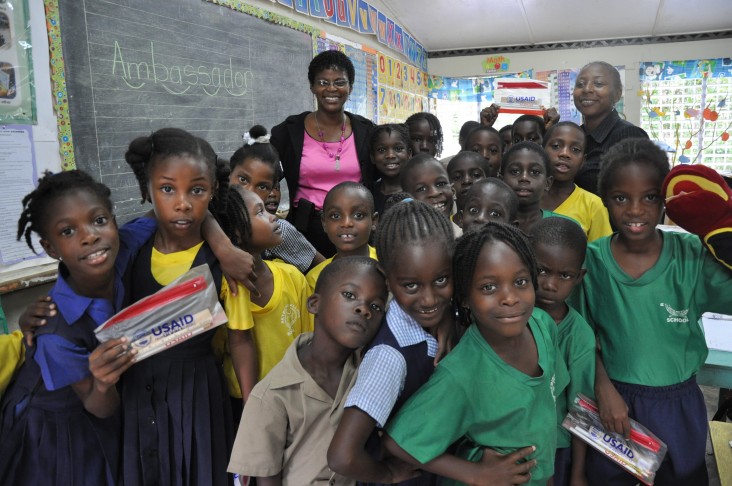
March 2017—In the isolated, serene hills of St. James on Jamaica’s west end sits the quaint little school of Retrieve Primary. The school hosts a total of approximately 120 students from grades 1 to 6. But until 2010, only 30 students attended the school.
Former principal Yvonne Hardy remembers what it was like when she took over the reins of the school, where close to 80 percent of the students come from lower-income families. “I would walk from house to house for months asking parents why their children were not in school and encouraging them to enroll. When I first arrived in 2010, our students had a pass mark of 33 percent in the local grade 4 literacy and numeracy test, and I knew this was going to be a challenge.”
Hardy immediately took action. Along with the teachers, she began pulling students from the mainstream classroom and placing them in one-on-one programs and side groups where they could focus on literacy, basic math, and comprehension skills. Hardy credits daily lesson plans and a school reading assessment plan with helping to plot a way forward for the students.
The reading assessment plan springs from the Early Grade Reading Assessment, which is funded by USAID and other international donor agencies. The assessment is a 15-minute oral test that measures the ability of individual students to perform fundamental pre-reading and reading skills.
USAID worked with the Government of Jamaica to design the Early Reading Assessment Checklist (ERAC) for use by teachers in the classroom, which was instrumental in creating the assessment plan. The plan was tailored to suit the local context in 2010, impacting more than 60,000 students.
“I had heard from other teachers that the ERAC worked and I wanted to see for myself, so I would personally conduct the sessions with our students, and it does work!” Hardy recalls. “What I love about it is how detailed the form is, and it gives us the opportunity to closely monitor the progress and challenges of our students.”
For Retrieve Primary, the Early Grade Reading Assessment and Checklist have had a measurable impact. By 2012, 100 percent of the school’s students passed the grade 4 literacy and numeracy test, according to Hardy. In fact, she was so impressed with the program and her students’ improvement that she pulled her son from another school and enrolled him at Retrieve.
Hardy attributes the increase in student attendance to the reading program. “My vision is now a reality,” she says.
Today, Hardy has been promoted to regional education officer with the Ministry of Education and oversees 22 schools in the island’s western region. She uses her experience at Retrieve to help the schools she oversees.
“In my new role as education officer, I look at the general supervision of the school, but, most importantly, I monitor the teaching and learning to ensure that the schools are on the right path,” she says.
And while Hardy is no longer principal at Retrieve Primary, her legacy remains. The school still boasts that 100 percent of its students have passed the national literacy and basic math tests.
Since 2006, Research Triangle Institute International, with the support of a range of donors, has worked with education experts to develop and implement the Early Grade Reading Assessment in more than 50 countries and 70 languages.
LINKS
Follow @USAIDJamaica, @USEmbassyJA, on Facebook, on YouTube







Comment
Make a general inquiry or suggest an improvement.